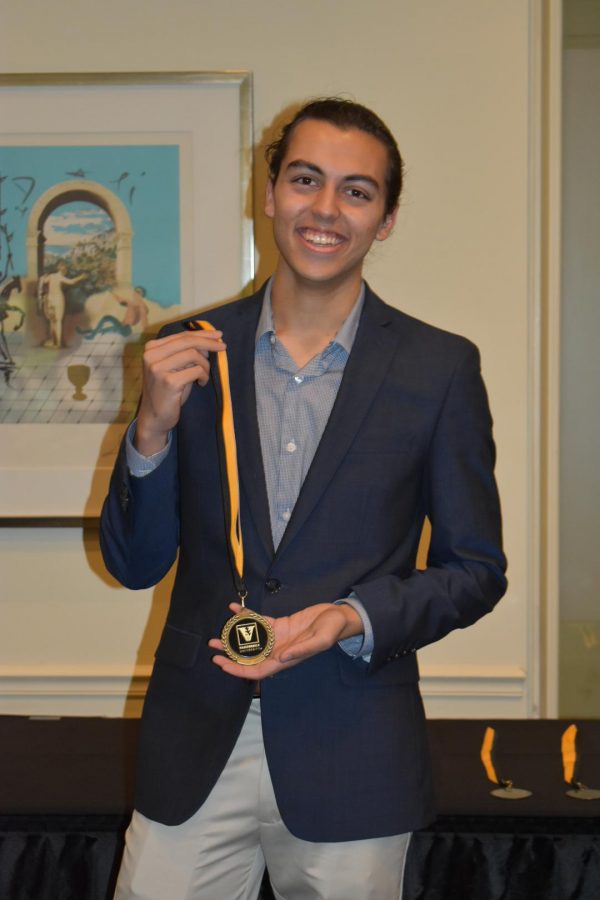October 2015: I was two months into would ultimately become an incredibly humbling and formative Vanderbilt experience, but I still didn’t feel at home; I still wasn’t “happy.” I was finding my footing in a seemingly unknown community, worrying nobody cared about me, calling home to find solace in family and old friends whom I knew cared. I wanted to fit in. I wanted to find home.
At the time, I didn’t know what home at Vanderbilt really looked like. I was young, growing, learning: grasping on to anything and everything that made me feel valued. And so, there I was: sitting in the stands of Vanderbilt Stadium watching what seemed to me the 10 most loved, most celebrated, most Outstanding people at Vanderbilt. This is who I wanted to be. Impactful. Visible. Celebrated.
I’ve asked myself “what does it mean to be Outstanding?” many times since I first heard it used on this weekend three years ago. I remember my bold aspirations to be Kevin Groll and Rebecca Chong and Sam Hoskins and Pranjal Gupta and Safiah Hassan and the rest of that year’s “Top 10.”
I took on big projects, sought big impacts, strove towards tangible goals and real change
This allure of Outstandingness drove unhealthy levels of involvement through the first half of my Vanderbilt career. I did a bit of everything, allowing broad interests and desire for recognition to fuel commitments that occupied time I didn’t have. How many more meetings-that-could-have-been-emails should I squeeze between 1:00 p.m. linear algebra and my 3:00 p.m. internship? I stretched myself way too thin, continually overworked and underslept, chronically exhausted and predictably lonely. My lifestyle left me friendly with many but friends with few. I felt shallow, a perpetual waving-machine, meeting-attender and test-studyer with no room left for a real personality. Was this Outstanding?
As I felt the onset of an ever-so-common Vanderbilt burnout, I started consciously redefining my responsibilities and re-evaluating my purpose. I moved away from involvements for sake of involvement and toward involvements for sake of impact and sought very intentionally to act on my passions rather than my desire for recognition. I wanted to leave a positive legacy, to find my place, to be rejuvenated by my busy schedule. I looked forward to developing curriculum for the Greek Inclusivity Alliance or working on new rocket designs. I took on big projects, sought big impacts, strove towards tangible goals and real change; I was no longer a figurehead, I was a leader. Was this Outstanding?
Through the multiple involvements that have spanned my Vanderbilt experience, my eyes opened to the incredible diversity of talent that exists on this campus. Because I was no longer seeking recognition, I was able to value my peers not for their affirmation but for their talents. I grew to understand that every Vanderbilt student is here for a reason; we each have a space and place to contribute to our own meaningful and transformative campus experience. It took me years of introspection to foster a discovery of my strengths, reorientation of my passions, and reconciliation of my identities that laid the foundational self-confidence by which I was now able to define my Vanderbilt experience instead of letting it define me. I was living my truth. Was this Outstanding?
In each one of my roles on this campus, I’ve encountered truly outstanding people: my friend who repeatedly blows me away with his deep knowledge of civil rights policy and his work with the ACLU of Tennessee; my friend who is a Computer Science and Mechanical Engineering double major, one of the most talented design engineers I know; my friend who speaks four languages and will attend Harvard Law School; my friend who took a gap year to perfect her already incredible writing and photography. Though none of them may have shared the field with me this past Saturday, all are just as outstanding as each us in this year’s “Top 10.”
I am immensely proud and deeply humbled to be recognized as one of Vanderbilt’s Top 10 Outstanding Seniors, but I write this to caution both you and a younger me. Highly-visible, student-facing, and organizationally-involved, I recognize that yes, we are Outstanding at Vanderbilt, but we aren’t all that is outstanding at Vanderbilt. When I think back to that first homecoming game, to those whom I so intentionally modelled myself after, I wish I had received the advice I give now: don’t aspire to be me, aspire to be you. That is Outstanding.
Henry Bristol is a senior in the School of Engineering. He can be reached at henry.bristol@vanderbilt.edu.

